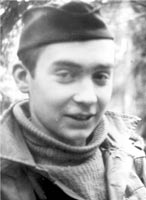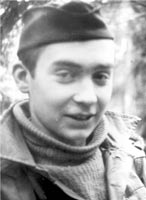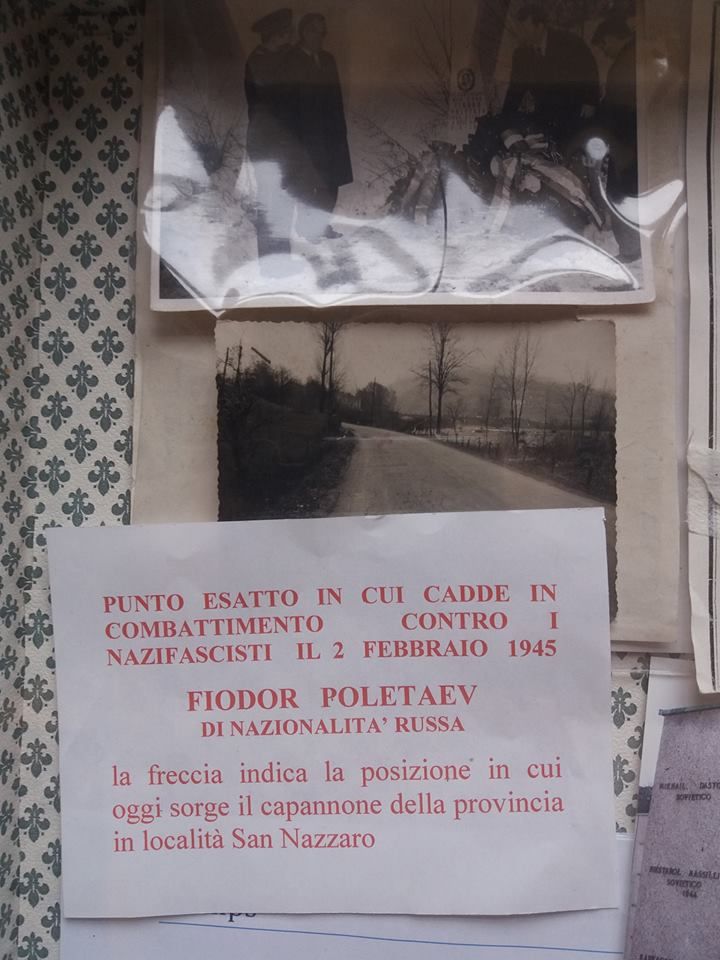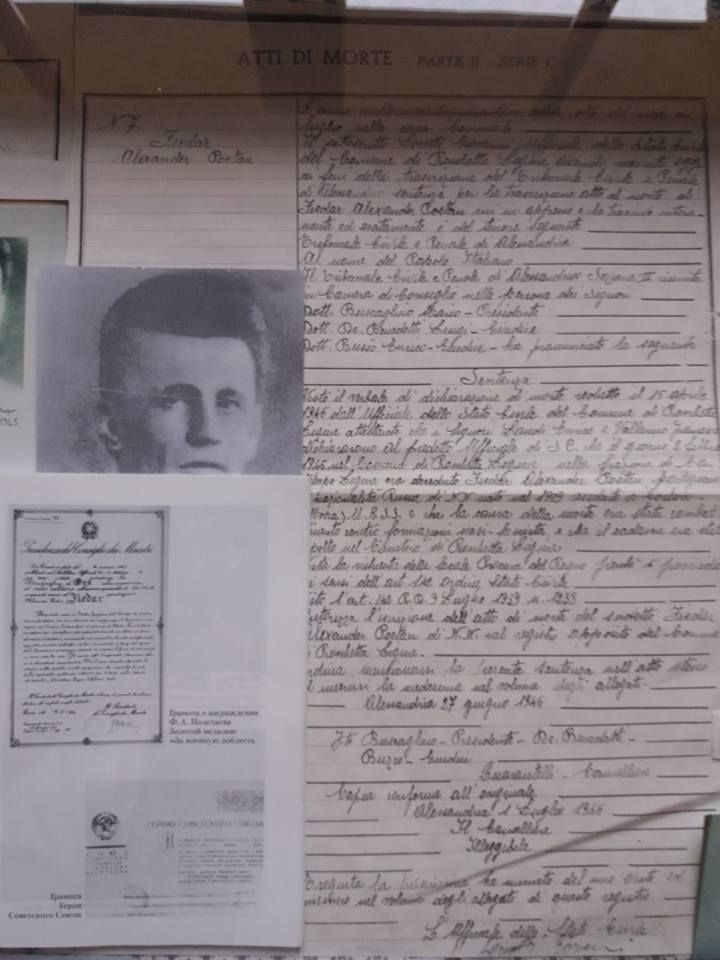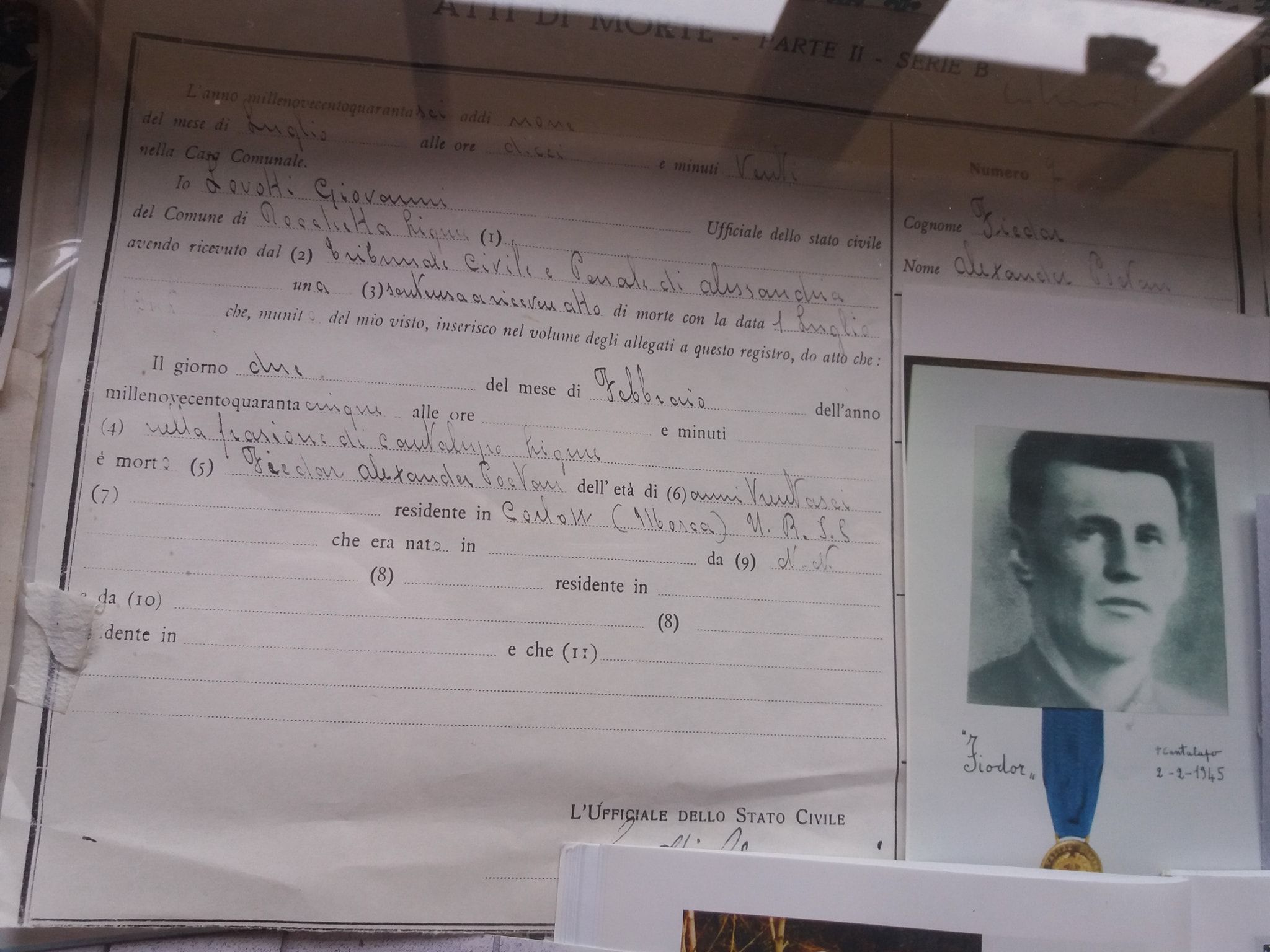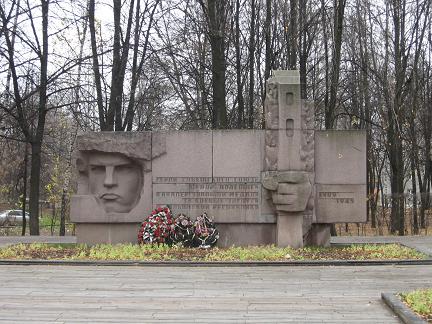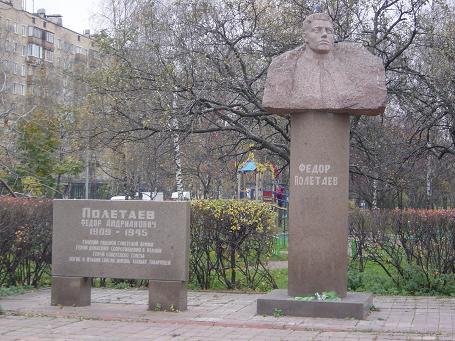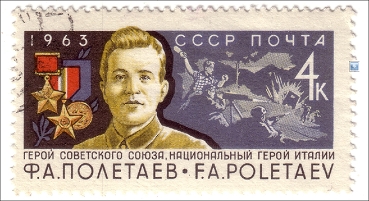In 1939, due to the outbreak of the Second World War, he was called to fight in the Red Army in the 280th Artillery Regiment of the 780 Rifle Division, which changed their name to the 90th "Rifilieri della Guardia" Division with the decree of the People's Commissar of November 26th 1941 where he reached the rank of sergeant of the Red Army. In June 1942 he was captured by the Germans and taken to the Vjaz'ma concentration camp. From here he was taken to Perticev, then to occupied Poland and finally transferred to Italy.
In July 1944, while he was interned in a concentration camp near Tortona, he contacted some members of the Resistance and fled with other Soviet prisoners from the prison camp, joined the partisans on the Ligurian Apennines and was incorporated into the BIRS Detachment (Banda italo). Russian sabotage) which was part of the 798 Brigade "A. Mazzarello". In October, on the orders of the VI Zone Command, for tactical reasons, the Brigade was dissolved and went to fight in the 58th "Oreste" Brigade of the "Cichero" Garibaldi Division. On 8 October 1944, on the orders of the Brigade, "Pinan" left and went to fight in the new "Nino Franchi" detachment.
Monument to Fëdor in Cantalupo Ligure, place where he lost his life in combat, on 2 February 1945
On October 27, 1944 his detachment took up position at Roccaforte Ligure in val Borbera. Shortly afterwards it was transformed into Battaglione and moved close to the Gorges of Pertuso, also in Val Borbera. In the village of Lemmi went the new "Peter" detachment of the "Franchi" battalion. After passing the Nazi-Fascist roundups of the winter of 1944-1945, he was killed in the Battle of Cantalupo on 2 February 1945 while he was protecting the momentary retreat of some comrades. The combat was however won by the partisan forces.
«In July the" Gigante Fiodor ", as the partisans would have called him, for his physical prowess ... »
"So we approached fifty meters from the enemies, always shooting and lying in the snow. But the fighting continued to persist, and would probably last until the end of our ammunition, the well-armed enemy resisted, we had to turn the situation upside down in our favor. At one moment, Fiodor, a Russian who was with me, shouting in Russian (language that included the so-called Mongols (but in fact Ukrainians [ed]) rushed forward with his sten now almost unloaded to a few meters from the Mongols, terrorizing them both for the audacity of his sudden action as for his gigantic figure that he trod on the enemy. [2] »
Fëdor received the Hero Medal of the Soviet Union and is among the very few cases in Italy of foreigners, all Soviet, who were awarded the gold medal for military valor. Three other Soviet partisans were decorated posthumously with the military gold medal: Nikolaj Bujanov, who fought near Arezzo, Fore Mosulishvili, who fell near Novara and Daniil Avdeev, (captain Daniele), commander of a battalion of partisans, killed in Friuli. Avdeev had assembled in a single brigade the Soviets escaped to the Nazi-Fascists and had placed it under the command of the Garibaldi Brigades in Friuli. [The Russians who fought in the Italian resistance were more than 5000 (about 5500: note out of citation) of which 717 in Piedmont, mostly in the provinces of Turin, Cuneo, Novara. Poletaev is buried in Genoa in the cemetery of Staglieno.
In 1939, due to the outbreak of the Second World War, he was called to fight in the Red Army in the 280th Artillery Regiment of the 780 Rifle Division, which changed their name to the 90th "Rifilieri della Guardia" Division with the decree of the People's Commissar of November 26th 1941 where he reached the rank of sergeant of the Red Army. In June 1942 he was captured by the Germans and taken to the Vjaz'ma concentration camp. From here he was taken to Perticev, then to occupied Poland and finally transferred to Italy.
In July 1944, while he was interned in a concentration camp near Tortona, he contacted some members of the Resistance and fled with other Soviet prisoners from the prison camp, joined the partisans on the Ligurian Apennines and was incorporated into the BIRS Detachment (Banda italo). Russian sabotage) which was part of the 798 Brigade "A. Mazzarello". In October, on the orders of the VI Zone Command, for tactical reasons, the Brigade was dissolved and went to fight in the 58th "Oreste" Brigade of the "Cichero" Garibaldi Division. On 8 October 1944, on the orders of the Brigade, "Pinan" left and went to fight in the new "Nino Franchi" detachment.
Monument to Fëdor in Cantalupo Ligure, place where he lost his life in combat, on 2 February 1945
On October 27, 1944 his detachment took up position at Roccaforte Ligure in val Borbera. Shortly afterwards it was transformed into Battaglione and moved close to the Gorges of Pertuso, also in Val Borbera. In the village of Lemmi went the new "Peter" detachment of the "Franchi" battalion. After passing the Nazi-Fascist roundups of the winter of 1944-1945, he was killed in the Battle of Cantalupo on 2 February 1945 while he was protecting the momentary retreat of some comrades. The combat was however won by the partisan forces.
«In July the" Gigante Fiodor ", as the partisans would have called him, for his physical prowess ... »
"So we approached fifty meters from the enemies, always shooting and lying in the snow. But the fighting continued to persist, and would probably last until the end of our ammunition, the well-armed enemy resisted, we had to turn the situation upside down in our favor. At one moment, Fiodor, a Russian who was with me, shouting in Russian (language that included the so-called Mongols (but in fact Ukrainians [ed]) rushed forward with his sten now almost unloaded to a few meters from the Mongols, terrorizing them both for the audacity of his sudden action as for his gigantic figure that he trod on the enemy. [2] »
Fëdor received the Hero Medal of the Soviet Union and is among the very few cases in Italy of foreigners, all Soviet, who were awarded the gold medal for military valor. Three other Soviet partisans were decorated posthumously with the military gold medal: Nikolaj Bujanov, who fought near Arezzo, Fore Mosulishvili, who fell near Novara and Daniil Avdeev, (captain Daniele), commander of a battalion of partisans, killed in Friuli. Avdeev had assembled in a single brigade the Soviets escaped to the Nazi-Fascists and had placed it under the command of the Garibaldi Brigades in Friuli. [The Russians who fought in the Italian resistance were more than 5000 (about 5500: note out of citation) of which 717 in Piedmont, mostly in the provinces of Turin, Cuneo, Novara. Poletaev is buried in Genoa in the cemetery of Staglieno.
Sponsored by Ancestry
Advertisement
Advertisement
